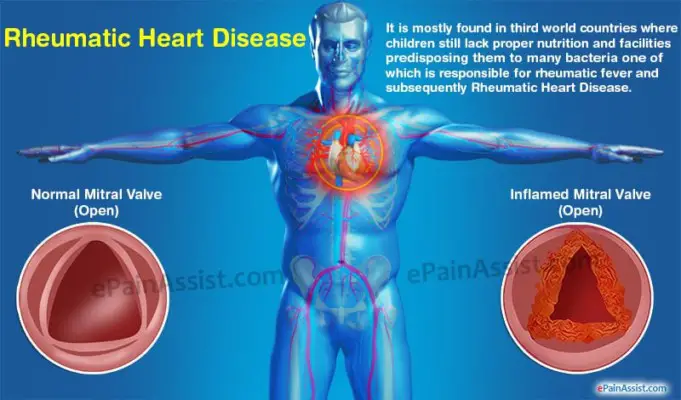Rheumatic heart disease refers to the damage in one or more heart valves that can develop after a rheumatic fever. An untreated rheumatic heart disease can cause complications that are life-threatening in many cases. Therefore, it is necessary to be informed about this disease.
As discussed, it is known that this heart disease is the result of recurring rheumatic fever. The damaged valves may result in complications like heart failure, atrial fibrillation and infection in the valves.
What is Rheumatic Fever?
An inflammatory disease, Rheumatic fever is a complication that develops when strep throat or scarlet fever is treated improperly. The fever occurs mostly in children with ages between 5 to 15 years. However, it can affect adults as well.
The fever is known to affect the connective tissues throughout the body, but it has adverse effects on the heart, brain and skin. The disease can cause permanent damage to the heart leading to Rheumatic heart disease.
The Causes of Rheumatic Fever
The main cause of Rheumatic Fever is group A streptococcus. Group A streptococcus infects the throat causing strep throat. If group A streptococcus is not treated on time and properly, the chances of developing rheumatic fever in later stages of life increases. Rheumatic fever typically develops after two to four weeks of a throat infection.
However, there are also some other causes or risk factors behind rheumatic fever. Some of them are listed below:
- Genetic: The chances of developing a rheumatic fever increases if a family member has suffered from it previously
- Environmental Factors: Factors like unhygienic surroundings, lack of clean water and overcrowded areas also increase the chances
Know the Symptoms of Rheumatic Fever
Identifying the symptoms at an early stage is one of the best steps towards the treatment of any disease. Rheumatic fever also has few symptoms that mark its onset. Some of the most common symptoms are as follows:
- Sore Throat
- Trouble in Swallowing
- Redness and Swelling in Tonsils
- Headache
- Nausea
- Fever
Other Symptoms
In case the rheumatic fever has resulted in Rheumatic heart disease, you can witness:
- Pain in Chest
- Heart Palpitations or missing heart beats
- Thumping Sensations in the Chest
- Shortness in Breath
- Excessive Fatigue
- Swelling in Stomach, Ankles, and Wrists
Upon identification, the patient must be rushed to the hospital to get appropriate treatment. With the advent of excellence in medical science, there have emerged a vast range of heart specialist hospitals across the nation.
For instance, hospitals such as Max Healthcare that specialize in heart attack treatment in Delhi can offer best treatment and care in such critical situation.
Complications of Rheumatic Heart Disease
If Rheumatic Heart Disease does not get treated in time, it will lead to some of life-threating complications that include:
-
Heart Failure
One of the major complications of Rheumatic Heart Disease is heart failure. When Rheumatic fever damages the heart valves, they stop pumping blood effectively, thereby leading to heart failure.
-
Arrhythmia
Also known as Atrial Fibrillation (AF), this refers to an abnormal heart rhythm. Due to the improper functioning of heart valves, shortness of breath and palpitations occur in patient’s heart. This also leads to an increased risk of stroke.
-
Stroke
When the brain does not get proper supply of blood, it may result in a stroke. People suffering from Rheumatic Heart Disease are prone to stroke due to formation of a blood clot in the heart which gradually blocks blood flow to the brain.
-
Complications in Pregnancy
If a woman is suffering from Rheumatic Heart Disease, then there are chances that she will have significant troubles during pregnancy and labour. Pregnancy makes the heart work harder, and as the heart is already suffering from damage, it may not be able to adjust to the new changes. This can result in heart failure.
-
Endocarditis
It is the infection in the inner lining of heart valves and heart chambers. Some of its common symptoms are fever, night sweats, and chest pain, swelling in legs, fatigue and shortness of breath.
Calculating the possible impacts of the above-listed complications of rheumatic heart disease, there is no doubt that an immediate and effective treatment is the need of the hour. Hence, one must not try to ignore the criticality of this disease and consult a skilled doctor in time.
The treatment of rheumatic heart disease varies depending on the extent to which the disease has affected the patient. After a number of diagnostic tests including Cardiac MRI and Echocardiogram (echo), the doctors determine the specific treatments.
It is important to remember the fact that though rheumatic heart disease is chronic and fatal in some cases; however, it is preventable. It just needs the right steps and timely medical consultation.












